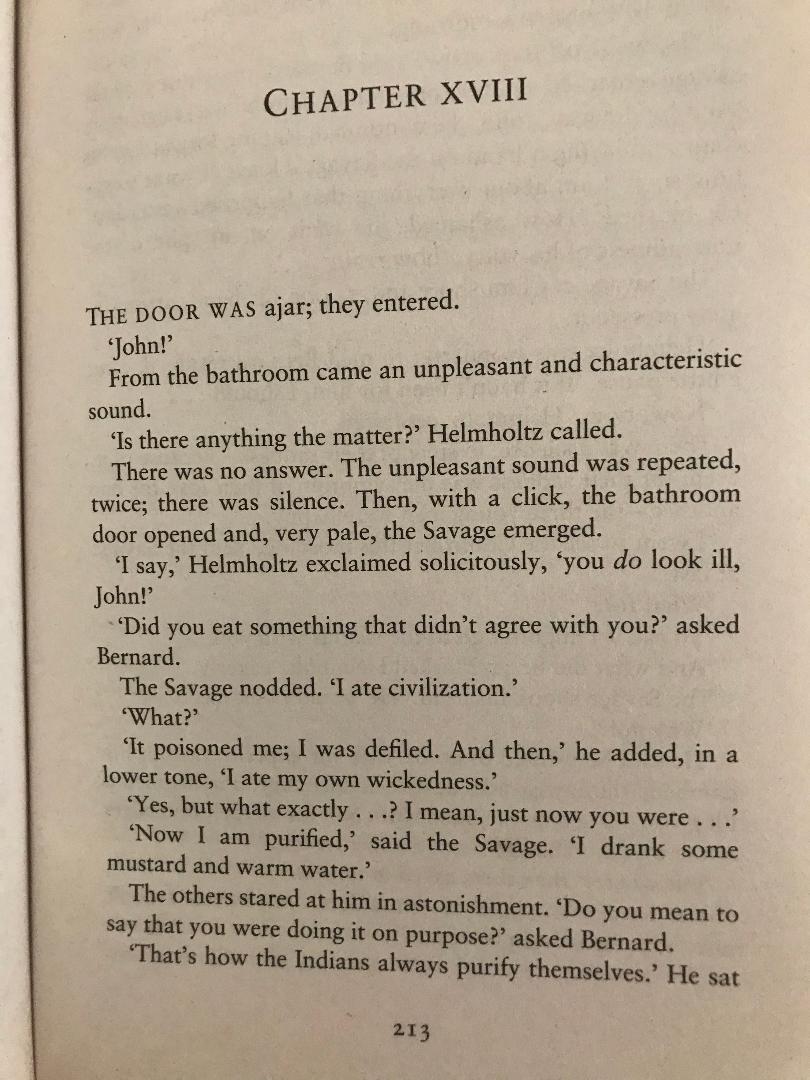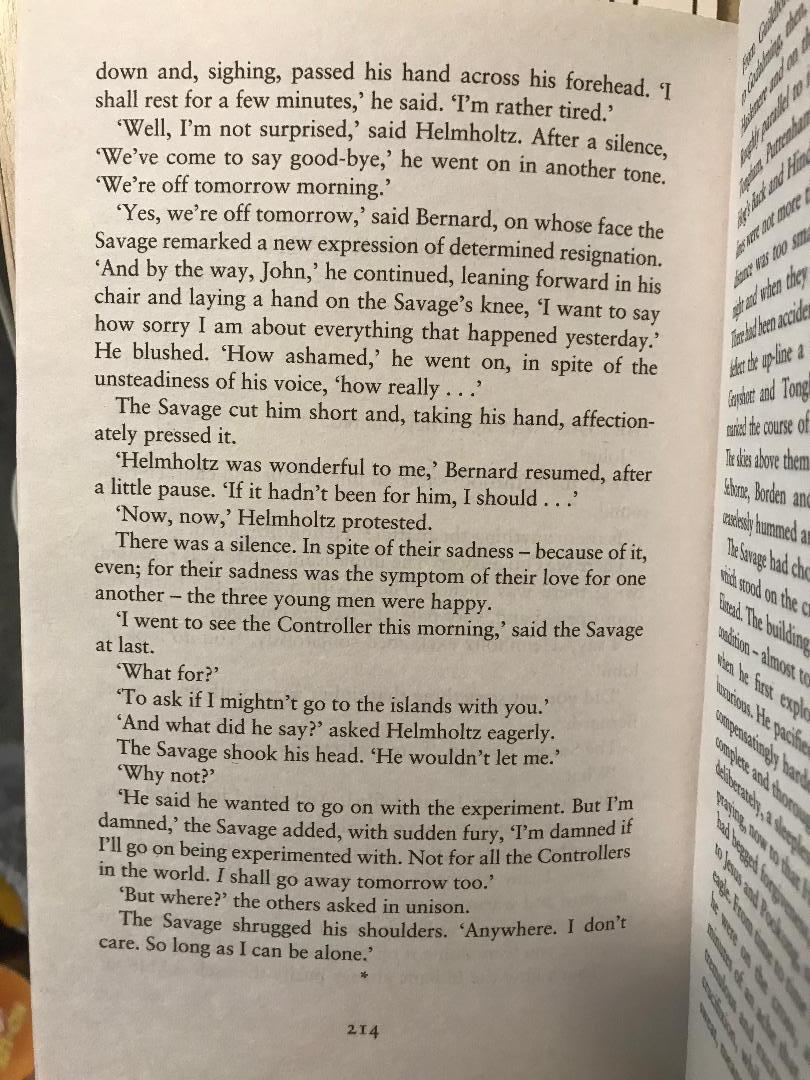› Forums › Reading Club 13+ › 13+A1
- This topic has 15 replies, 3 voices, and was last updated December 13, 2020 by
Beth.
-
AuthorPosts
-
-
at 20:06 #9117
Beth
ParticipantSummary of Lesson 1
In today’s lesson we began studying our first book: Brave New World by Aldous Huxley. The powerpoint with all of the resources is attached below, which should be used to help plan and write the paragraphs assigned for homework. The powerpoint contains loads of information on the context of Brave New World, thinking about how understanding of Huxley’s views on technology and science and the historical context of the two world wars can influence and enrich our interpretations of the novel. We thought about the genre of dystopia, and about how typical Brave New World is of this genre, and also discussed what modern parallels can be drawn between the society in the novel and society today, thinking particularly about issues of class and state surveillance. We also considered how to form well-evidenced and well-structured opinions critiquing literature, thinking about how the use of references to the text and quotations can be used to strengthen and affirm our arguments. We had an enlightening discussion on everyone’s favourite and least favourite parts of the book, and the class did some great work thinking about how the history and philosophy behind a book can influence our thinking about it. The class worked brilliantly in today’s lesson, I was super impressed by how insightful, passionate and energised all the students were. We had a particularly fantastic conversation about the concept of social media being our generation’s version of soma, and thinking about the role of hierarchy in dystopian society, linking our thoughts to modern day examples of caste systems and hierarchical structures such as in North Korea. I really enjoyed hearing the students’ thoughts about technology and the way in which it shapes society, and was really impressed by their ideas and knowledge surrounding dystopias and utopias. The students dealt with some huge and complex political and philosophical ideas today, and they tackled these really well- I really look forward to the rest of our lessons together! Well done everyone, and keep up the fantastic work! 🙂
Homework
The documentary I recommended in the lesson is The Social Dilemma, it’s on Netflix and really gives you a powerful insight into the extent to which some of Huxley’s predictions are coming true today. Watch it if you can, it’s super interesting and will really help you to think more broadly about the problems Huxley identifies with our reliance on technology.
Also, remember to read the facts about Aldous Huxley’s life on Slide 7 of the PowerPoint!
Attachments:
You must be logged in to view attached files. -
at 18:22 #9286
Benjamin
Participant<span style=”text-decoration: underline;”>Homework:</span> What is so bad about the World State portrayed
in Brave New World?<span style=”text-decoration: underline;”>Answer: </span>Even though there is a hierarchy in which everybody is in, the whole place is in a complete mess. People are judging other people they are glad not to be them: e.g. I’m glad I’m not an alpha, they have to work so hard. Also the idea of a hierarchy is quite unfair because alphas and betas have to work very hard and they could be judged and bullied by the gammas and the deltas and epsilons are often regarded as “idiotic” just because they are a lower rank. Because of this hierarchy, people are constantly being bullied and have no freedom: they can only work (even the epsilons). Also “soma” is making the citizens do extra work when they make the choice not to. If things keep going up like this, the population will eventually reach the “Malthusian Limit” and the nation will be on the edge of disaster.
-
at 14:37 #9327
-
-
at 09:14 #9341
Beth
ParticipantSummary of Lesson 2
In today’s lesson we continued our study of Brave New World by Aldous Huxley, this time delving deeper into the core of the book itself to think about themes. The powerpoint with all of the resources is attached below, which should be used to help plan and write the paragraphs assigned for homework. The powerpoint contains lots of information on the thesis that Brave New World acts as a parody of Shakespeare’s The Tempest, our thoughts on why examining literary influences matters, and the identification and analysis of thematic material in the novel, thinking about how to fit this into Point, Evidence, Explain essay paragraphs. We also had a fantastic discussion at the beginning of the lesson recapping on last week’s ideas of context and relevance in the modern world, and the students engaged in a really excellent debate at the end of the lesson, with half the students arguing ‘for’ a proposition on the place of love in Brave New World, and half the students arguing ‘against’. They demonstrated their understanding of the novel beautifully and were able to really thoroughly evidence the claims they made with quotational evidence and thematic ideas. I was super impressed with their work today, they all worked beautifully together as a class, bouncing off each others’ ideas and engaging with each others’ points of debate. I loved the amount of themes the class was able to idenitfy as crucial in the fabric of the novel, and the way that they wrote about them in their P.E.E. paragraphs using quotations from the text was fantastic. The class also engaged really brilliantly with discussing the thesis that links Huxley and Shakespeare; thinking about the fact that “Brave New World” is a quote from The Tempest, they drew together lots of links and pieces of evidence to decide whether or not they agreed with the theory. Everyone in this class always has a strong, thoughtful and well backed-up opinion on the subjects we discuss, which is really excellent and is definitely strongly encouraged by me! Being able to form opinions at this age is absolutely crucial and these students are very good at it- keep it up guys! Everyone contributed really fabulously today, there were a lot of astute, mature and sophisticated contributions from each and every student that really impressed me. I really look forward to our next lesson together, well done everyone and keep up the amazing work! 🙂
Homework
Attachments:
You must be logged in to view attached files. -
at 21:10 #9410
 JerryParticipant
JerryParticipantTechnology in Brave New World is catastrophic. The idea of The World State controlling birth and privacy is a very saddening and a tremendously terrible idea. Furthermore, heirachy is an abusive system. Alphas and betas need to work very hard while others can relax. However, Epsilions get mocked about their dyslexia and they get called ‘semi-morons’.
Additionally, the drug ‘soma’ controls everyone. Meaning there is no fun, privacy or freedom. The government are especially corrupt in Brave New World.
-
at 22:01 #9454
-
-
at 16:09 #9431
Benjamin
ParticipantHomework: How does Huxley present the theme of technology in Brave New World?
Answer: Aldous Huxley presents technology in “Brave New World” is incredibly intelligent yet totally catastrophic because The World State is controlling the citizens illegally in modern laws using a drug known as “soma” it creates happiness and so consequently will make the citizens want to do more work when in reality they don’t. Another unfair yet crucial aspect of “Brave New World” is the hierarchy system. It is as equally unfair to the citizens as “soma” is. The main idea of the hierarchy is to see who is smarter (Alphas and Betas)and who is more foolish (Deltas and Epsilons). All the citizens are treated badly and poorly just because of their rank on the hierarchy e.g. Citizens with higher ranks have to do more work and barely even get paid. Citizens with lower ranks are often regarded as foolish or morons. So you are either a person with a higher rank or a person with a lower rank, in conclusion, everyone in the book is treated badly. Finally, the way that The World State can even find out who is what rank is also a matter of technology.
-
at 16:09 #9432
Benjamin
ParticipantHomework: How does Huxley present the theme of technology in Brave New World?
Answer: Aldous Huxley presents technology in “Brave New World” is incredibly intelligent yet totally catastrophic because The World State is controlling the citizens illegally in modern laws using a drug known as “soma” it creates happiness and so consequently will make the citizens want to do more work when in reality they don’t. Another unfair yet crucial aspect of “Brave New World” is the hierarchy system. It is as equally unfair to the citizens as “soma” is. The main idea of the hierarchy is to see who is smarter (Alphas and Betas)and who is more foolish (Deltas and Epsilons). All the citizens are treated badly and poorly just because of their rank on the hierarchy e.g. Citizens with higher ranks have to do more work and barely even get paid. Citizens with lower ranks are often regarded as foolish or morons. So you are either a person with a higher rank or a person with a lower rank, in conclusion, everyone in the book is treated badly. Finally, the way that The World State can even find out who is what rank is also a matter of technology.
-
at 22:20 #9457
-
-
at 13:49 #9507
Beth
ParticipantSummary of Lesson 3
In today’s lesson we continued our study of Brave New World by Aldous Huxley, working on developing our skills of close textual analysis. The powerpoint with all of the resources is attached below, which should be used to help plan and write the paragraphs assigned for homework. The powerpoint contains lots of information on the use of inference in literary analysis, thoughts about character analysis, and prompts to help students consider how to discuss and analyse word choice, literary techniques, structure and author intent. It also includes a mark scheme for close textual analysis P.E.E. paragraphs completed in the lesson, and some thoughts on how to self-evaluate. We had some fantastic contributions thinking about the power of particular words, and the class completed some excellent work on synonyms. Everyone worked excellently today, I was particularly impressed by their inference work and how they conceptualised and completed the close textual analysis of the passage from Brave New World. The P.E.E. paragraphs produced were very good, and I loved how each student used quotational evidence to back up their arguments- fantastic work! Really well done everyone, I hope you have a lovely week and have fun applying your close textual analysis skills to the passage for homework. Keep up the fab work and I will see you all soon! 🙂
Homework
The passage I would like you to analyse is the first two pages of Chapter XVIII from the line “The door was ajar” up to the line “So long as I can be alone”. I’ll post pictures of the pages I mean below:


Attachments:
You must be logged in to view attached files. -
at 18:56 #9531
 JerryParticipant
JerryParticipantHuxley creates a sense of danger and suspense by using short sentences. This is clearly conveyed in the technique ‘They stared at him with astonishment.’ The word ‘astonishment’ gives a sense of shock and worry. Furthermore, the short sentence creates the atmosphere of both fast and slow motion, and makes the reader think in the characters’ point of view. Additionally, the verb ‘stared’ is usually used when fatality or jeopardy takes place.
-
at 10:28 #9690
-
-
at 11:33 #9693
Benjamin
Participant<span style=”text-decoration: underline;”>Question: </span>Using the excerpt you have been
given, answer the question ‘how does Huxley
create a sense of foreboding and danger?’
Remember to use quotations and close literary
analysis of the language, thinking about word
choice, literary techniques, and structural
features. This is due Friday 4th at 3 pm.<span style=”text-decoration: underline;”>Answer:</span> Aldous Huxley creates a sense of foreboding and danger by using short, snappy sentences such as,” Is there anything the matter? There was no answer.” ellipses are also used on page 213 and 214 to indicate this. Examples include: “Yes, but what exactly…?”~ Page 213 and “How really…”~ Page 214. Descriptive adjectives are also used here such as “It poisoned me; I was defiled. And then,” he added in a lower tone, “I ate my own wickedness.”~Page 213. This part of the chapter – and other sentences – makes “Brave New World” such a compelling read.
-
at 20:53 #9925
-
-
at 17:27 #9711
Beth
ParticipantSummary for Lesson 4
In today’s lesson we completed our study of Brave New World by Aldous Huxley, applying all we had learnt so far to an exam paper on the topic. The powerpoint with all of the resources and the 13+ exam paper are attached below, which should be used to help plan and write the mock exam question assigned for homework. The powerpoint contains lots of information on how to break down and analyse texts in an exam context, thinking particularly about skills of comparing and contrasting and about how to think about the provenance of a source using PACT. It also features both extracts from the Eton 13+ exam paper, along with the question assigned for homework. Everyone worked really well today, I really enjoyed our conversation at the end of the lesson about the moral of Brave New World and the lessons that should be drawn from it. I was also very impressed with how the class applied their skills of close textual analysis, using P.E.E. to talk about language, structure and literary techniques. There was some particularly excellent analysis of word choice and author intent, and I was really happy with everyone’s work on provenance and how they connected it to the historical context. It has been lovely working with all of you, you have all produced some really fab work and I hope to see you all again soon. Have an amazing Christmas, really well done for everything and keep up the fantastic work! 🙂
Homework
Here is the link to Brave New World Revisited, I’d really recommend reading at least the foreword of it as it gives a real insight into Huxley’s feelings about how the world has changed in the last one hundred years: https://www.huxley.net/bnw-revisited/
Attachments:
You must be logged in to view attached files.
-
-
AuthorPosts
- You must be logged in to reply to this topic.
